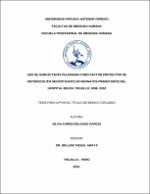Uso de surfactante pulmonar como factor protector de enterocolitis necrotizante en neonatos prematuros del Hospital Belén, Trujillo, 2008-2018

Ver/
Descargar
(application/pdf: 537.6Kb)
(application/pdf: 537.6Kb)
Fecha
2019Autor(es)
Delgado García, Silvia Karen
Metadatos
Mostrar el registro completo del ítemResumen
Objetivo: Determinar si el uso del surfactante pulmonar es un factor protector para la enterocolitis necrotizante en neonatos prematuros en el Hospital Belén de Trujillo 2008-2018.
Métodos y procedimientos: Estudio observacional, analítico, retrospectivo, de casos y controles. La población estuvo conformada por los neonatos prematuros de la Unidad de Cuidados Intensivos Neonatal del Hospital Belén de Trujillo durante el período 2008-2018. Se realizó un aleatorizado con 128 unidades de análisis divididas en 55 casos y 73 controles.
Resultados: Del análisis estadístico se determinó que las variables sociodemográficas de peso, edad gestacional, APGAR 5’, uso de glucocorticoides, alimentación enteral no presentaron resultados estadísticamente significativos. Se encontró que aquellos pacientes que usaron surfactante pulmonar intratraqueal tuvieron 0.35 veces protección de tener ENC en comparación con los que no lo usaron (IC95% 0.44-0.97, p=0.036)
Conclusiones: Se encontró que el uso de surfactante pulmonar es un factor protector para la enterocolitis necrotizante. Aquellos neonatos prematuros que recibieron surfactante intratraqueal presentaron protección de un 35% para no desarrollar enterocolitis necrotizante frente a los que no utilizaron surfactante intratraqueal. Objective: To determine if the use of pulmonary surfactant is a protective factor for necrotizing enterocolitis in preterm infants in the Hospital Belen de Trujillo 2008-2018.
Materials and Methods: Observational, analytical, transversal, retrospective study. The population consisted of premature neonates of the Neonatal Intensive Care Unit of the Belen de Trujillo Hospital during the 2013-2018 period. A randomization was performed with 146 analysis units divided into 73 cases and 73 controls.
Results: From the statistical analysis it was determined that the sociodemographic variables of weight, gestational age, APGAR 5 ', use of glucocorticoids, enteral feeding did not show statistically significant results. It was found that those patients who used intratracheal pulmonary surfactant had 0.35 times protection from having ENC compared to those who do not use (95% CI 0.44-0.97, p = 0.036).
Conclusions: It was found that the use of pulmonary surfactant is a protective factor for necrotizing enterocolitis. Those premature infants who received intratracheal surfactant had 35% protection to avoid developing necrotizing enterocolitis against those who did not use intratracheal surfactant.
Palabras clave
Colecciones
- Medicina Humana [3196]

